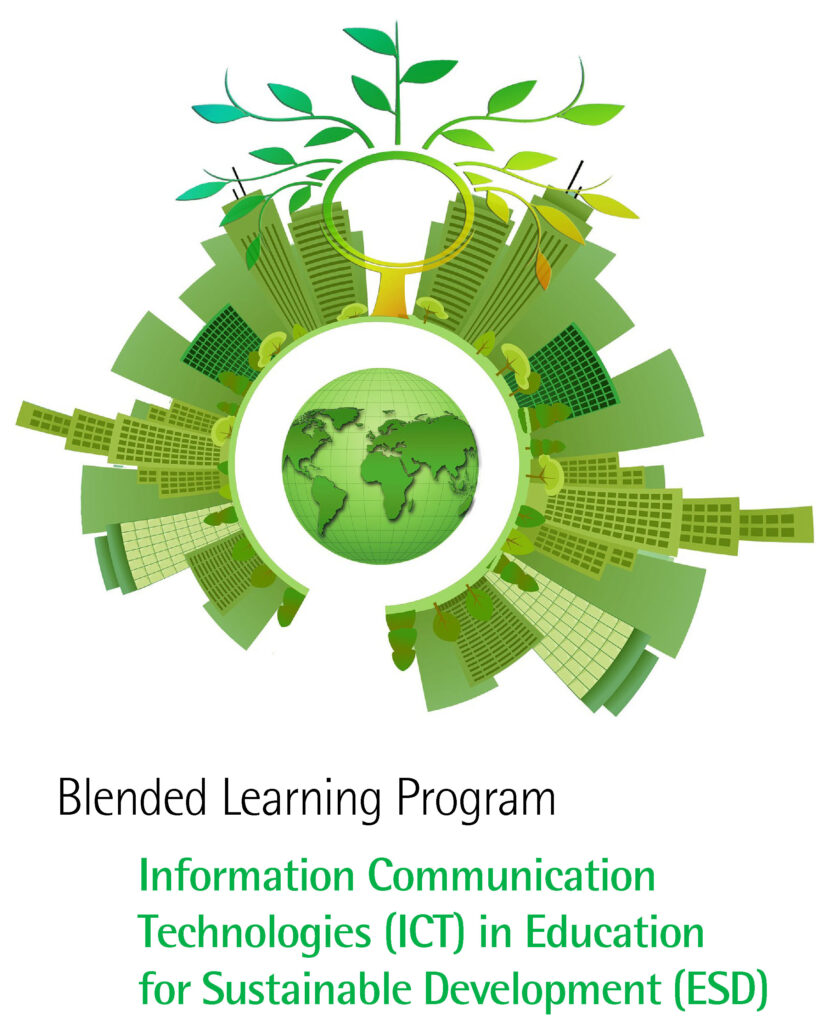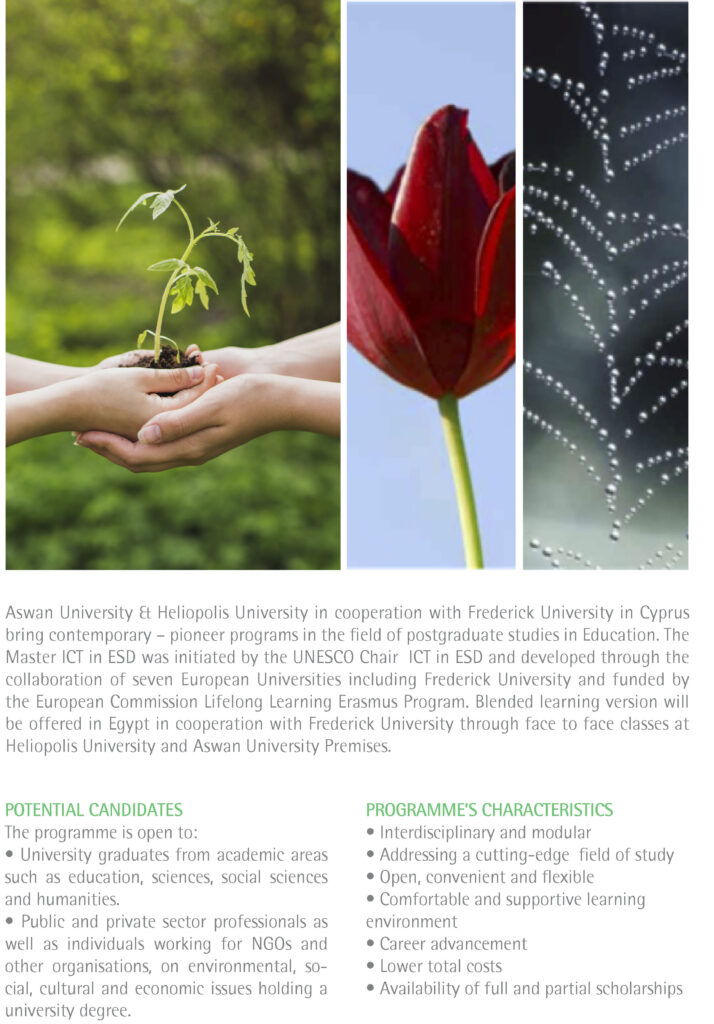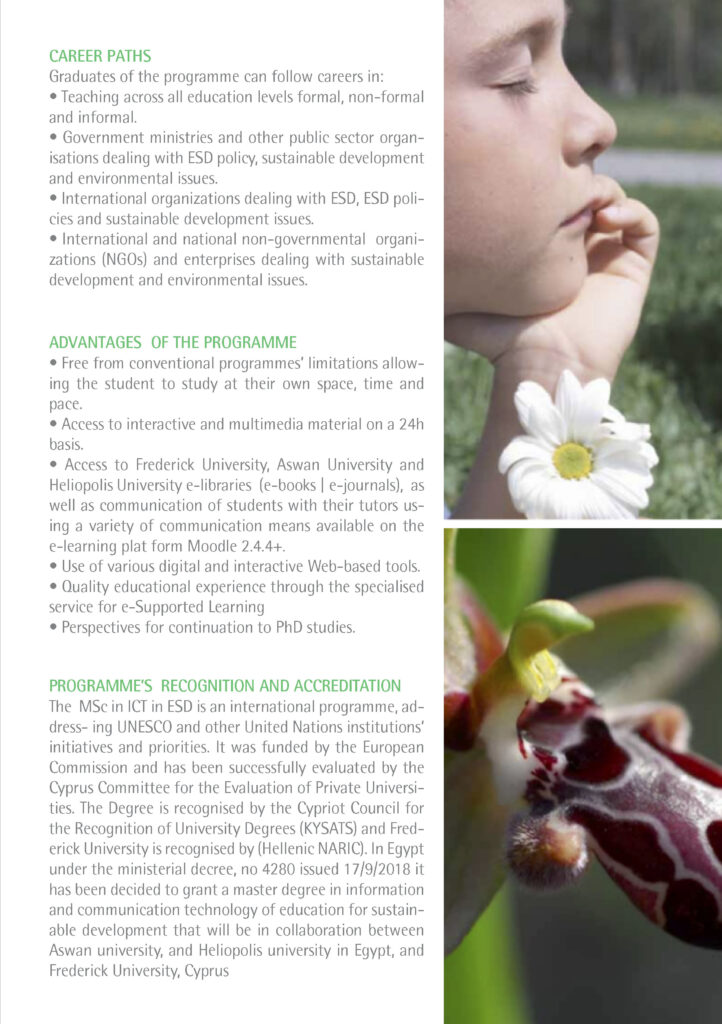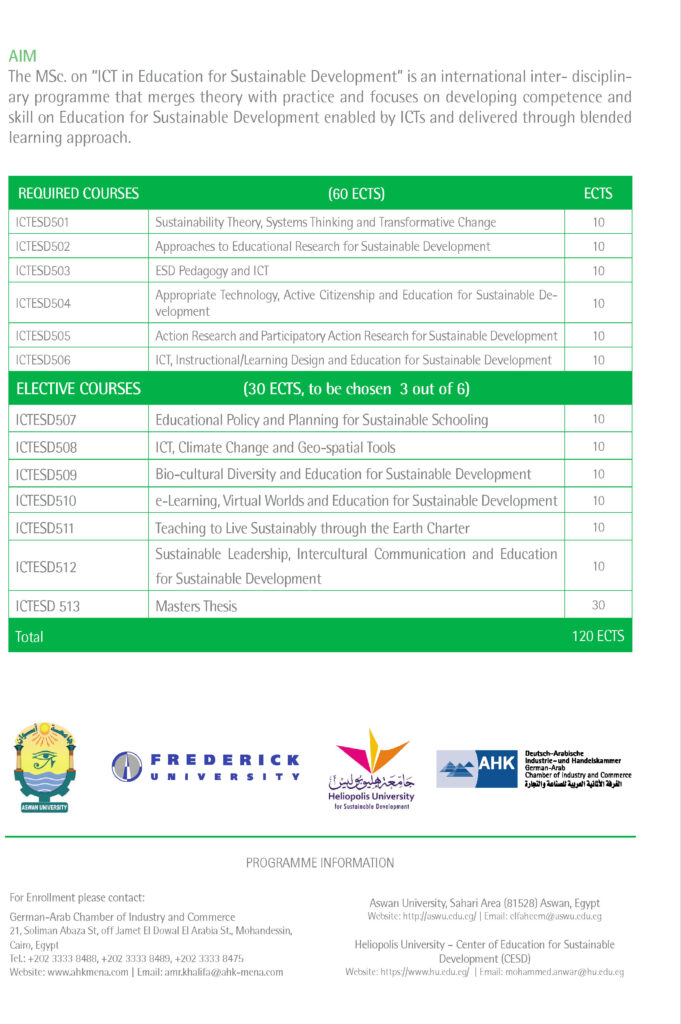Aswan University and Heliopolis University in cooperation with Frederick University in Cyprus bring contemporary – pioneer programs in the field of postgraduate studies in Education. The Master ICT in ESD was initiated by the UNESCO Chair ICT in ESD and developed through the collaboration of seven European Universities including Frederick University and funded by The European Commission Lifelong Learning Erasmus Program. Blended learning version will be offered in Egypt in cooperation with Frederick University through face to face classes at Heliopolis University and Aswan University Premises.




POTENTIAL CANDIDATES
The programme is open to:
PROGRAMME’S CHARACTERISTICS
CAREER PATHS
Graduates of the programme can follow careers in:
ADVANTAGES OF THE PROGRAMME
PROGRAMME’S RECOGNITION AND ACCREDITATION
AIM
| REQUIRED COURSES | (60 ECTS) | ECTS |
| ICTESD501 | Sustainability Theory, Systems Thinking and Transformative Change | 10 |
| ICTESD502 | Approaches to Educational Research for Sustainable Development | 10 |
| ICTESD503 | ESD Pedagogy and ICT | 10 |
| ICTESD504 | Appropriate Technology, Active Citizenship and Education for Sustainable De- velopment | 10 |
| ICTESD505 | Action Research and Participatory Action Research for Sustainable Development | 10 |
| ICTESD506 | ICT, Instructional/Learning Design and Education for Sustainable Development | 10 |
| ELECTIVE COURSES | (30 ECTS, to be chosen 3 out of 6) | |
| ICTESD507 | Educational Policy and Planning for Sustainable Schooling | 10 |
| ICTESD508 | ICT, Climate Change and Geo-spatial Tools | 10 |
| ICTESD509 | Bio-cultural Diversity and Education for Sustainable Development | 10 |
| ICTESD510 | e-Learning, Virtual Worlds and Education for Sustainable Development | 10 |
| ICTESD511 | Teaching to Live Sustainably through the Earth Charter | 10 |
| ICTESD512 | Sustainable Leadership, Intercultural Communication and Education for Sustainable Development | 10 |
| ICTESD 513 | Masters Thesis | 30 |
| Total | 120 ECTS |
PROGRAMME INFORMATION
To apply to join this master programme please send your CV to :
Ms. Menna Mohamed
Prof. Dr. Omar Ramzy
Director of Center of Education for Sustainable Development (CESD)-Heliopolis university
Email: omar.ramzy@hu.edu.eg
and Mr. Mohammed Anwar
Email: mohammed.anwar@hu.edu.eg
Frequently Asked Questions
It is estimated that the program will be completed within two years/4 semesters according to the performance, including the completion of the master thesis. The fees for the entire program are the equivalent of 6400 Euro according to the exchange rate of the payment.
This program is one of the unique interdisciplinary programs approved by the ministry of
higher education in Egypt. This program accepts students from educational backgrounds,
engineering backgrounds and ICT backgrounds and it is open for those who want to broaden their knowledge and experience about Sustainable Development and Education for Sustainable Development (ESD) from other disciplines.
This will be the first cohort of the program and we will have flexibility in this regard.
Documents needed and application form to be sent by email by the 3rd week of the September 2019 maximum and after that personal interview will take place at Heliopolis university premises in the beginning of October 2019. The 1st attendance phase will start in the 3rd week of October 2019.
The hereunder documents to be sent by email first to (ict.esd@hu.edu.eg) and later as hard copy at Heliopolis University after the acceptance in the program.
– University Certificate (Arabic and English if it is available)
– Military Statues Certificate for male applicants
– Updated Europass CV (can be developed from this link: https://europass.cedefop.europa.eu/documents/curriculum-vitae)
– National ID (Copy)
– 4 recent photos
– Application Form that will available soon on the website (to be filled and signed by
applicant) Some other documents will be requested upon the acceptance in the program.
If you complete the program successfully, you will receive a Master of Science (MSc) in
Information Communication Technology for Education for Sustainable Development (MSc in ICT for ESD), issued by the ASWAN University, Heliopolis University and Frederick
University (joint degree). The degree is worth 120 ECTS (European Credit System).
You will be enrolled at Heliopolis University for Sustainable development, Frederick
University and Aswan University.
No, but you have to show that your English is sufficient to study the entire program in
English; this will be evaluated during the personal interview.
The language of Instruction is English.
It means that part of the study will be in face to face classes and the other part will be delivered online.
Each program of study defines academic entrance criteria that are clearly specified in the program’s web site. Additionally, as all blended learning programs are provided via e-learning and face to face interaction in the same time, you would need to:
- Have access to a computer supported by speakers.
- Have a high-speed access (2Mbps+) to the Internet
- Be computer literate. This means that you have core competences in use a computer such as being able to use office applications (word processing, presentations, etc), manage files, and browse the Internet.
- Access to a web camera would be useful for communication but is not considered necessary.
Blended learning programs are designed particularly to accommodate the needs of professionals that may not be available at all times or have known commitments. It takes the benefits from the attendance phase and the online interaction in the same time.
Also, tele-meetings, teleconferences and other synchronous communication sessions are
recorded and available for students via online platform.
For such cases we can expedite the processes of the admission and personal interview and issuing a letter of admission after completing the requirements of the program.
Frederick University, Aswan University and Heliopolis University are providing facilities so that you can gain access to all electronic resources, including electronic books and software, remotely. Guides are provided to students to explain how this can be achieved.
The three universities are utilizing state-of-the-art software tools to verify that material
submitted is not plagiarized, either by fellow students or other sources. Detailed guidelines are given to students to assist them in making informed choices and warning messages are generated by the software used to protect against such practices. Participation in face to face sessions throughout the semester will provide more explanation for this.
According to the bylaw of the program, 75 % of the study will be online and 25 % will be in face to face interaction which mostly will take place at Heliopolis University premises.
The face to face classes where the students have to be physically attending the classes will be divided into 6 obligatory attendance phases as follows:
Semester 1 (2 attendance phases, 5 days for each phase)
Semester 2 (2 attendance phases, 5 days for each phase)
Semester 3 (2 attendance phases, 5 days for each phase)
Semester 4 Master thesis
All the dates will be published on the university website in advance before the beginning of the first semester.
Teaching staff will be nominated from the 3 universities (Frederick University, Heliopolis
University and Aswan University). In Addition, we will invite some of the expert in the field of ICT and Sustainable Development in order to enrich the learning experiences in the program.
You can pay all the admission and tuition fees by semester in cash at Heliopolis University or via Heliopolis University bank account (Bank details will be provided).
Graduates of the programme can follow careers in:
- Teaching across all education levels formal, non-for- mal and informal.
- Government ministries and other public sector organisations dealing with ESD policy, sustainable development and environmental issues.
- International organizations dealing with ESD, ESD policies and sustainable development issues.
- International and national non-governmental organizations (NGOs) and enterprises dealing with sustain- able development and environmental issues.
Scholarships are available according the performance for the students in the first semester and it will be examined case by case.


